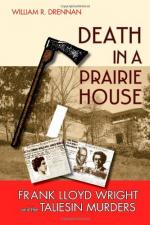|
This section contains 3,069 words (approx. 11 pages at 300 words per page) |

|
SOURCE: "Architect's Utopia," in Partisan Review, Vol. IV, No. 4, March, 1938, pp. 42-47.
In the following review, Schapiro critiques Wright's social vision as it is represented in Architecture and Modern Life, observing numerous "contradictions and naivetés" in the work.
Frank Lloyd Wright believes that only "organic architecture" or primitive Christianity—"Jesus, the gentle anarchist"—can solve the crisis. This was also the theme of his earlier book, The Disappearing City, written in the depths of the depression. If we forget the undergraduate poetizing of the great architect, now seventy years old ("the earth is prostrate, prostitute to the sun"), and his no less profound philosophizing ("what, then, is life?"), and if we strip his argument of the grand, neo-Biblical and neo-Whitmanesque theogonic jargon of "integral," "organic" and the man "individual," we come at last to a familiar doctrine of innocence and original sin and a plan of redemption...
|
This section contains 3,069 words (approx. 11 pages at 300 words per page) |

|


